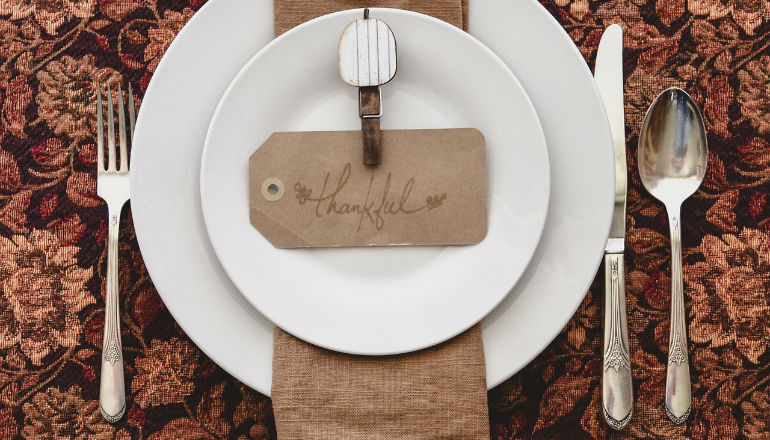 Reading Time: 5 minutes
Reading Time: 5 minutesThe holiday season is traditionally portrayed as a time of joy, celebration, and togetherness, where we give thanks for the past and look forward to the future.
In reality, it’s usually a time when we try to squeeze more things — parties, shopping, social activities, food, drinks, gifts — into our already full lives. We often do these things out of a sense of obligation, in the belief they’ll make our loved ones happier and bring us closer together.
Given the extra physical, mental, and emotional load the holiday season brings, it’s not surprising this time of year signifies stress, frustration, and resentment for many people. Much of that holiday stress comes from dealing with loved ones and extended family members in emotionally-charged situations, which seem to repeat year-in, year-out.
- Perhaps it’s your uncle Vinny retelling that embarrassing story from your childhood every time he sees you.
- Or your aunt Barbara’s passive-aggressive comments over the dryness of the turkey and the lumpiness of the gravy.
- Or that simmering conflict with your cousin Jim, which always turns into a heated argument after a couple of beers.
- Or your father-in-law’s comments about the kids’ behavior and how “things were different in his day.”
- Or your grandmother commenting about your appearance during dessert.
If the above examples sound familiar to you, rest assured we all have dramas with loved ones at some point in our lives. The nature of relationships means disagreement and conflict is normal, and it can be a healthy opportunity to adjust unhelpful behaviors.
During the holidays, though, the close confines of social gatherings — combined with a tendency to drink more alcohol and eat more sugar — leads to a diminished ability to regulate our emotional impulses. Cue the conflict, outbursts, and feeling like an angst-ridden teenager all over again.
Clearly this can impact our emotional well-being in the form of increased stress, anxiety, frustration, and overwhelm. It can also impact our physical well-being, particularly if we engage in compensatory and avoidance behaviors such as emotional eating, excess alcohol consumption, working longer hours, or over-exercising.
Rather than approaching this year’s gatherings as obligations to be tolerated — and steeling yourself for conflict and drama — there are ways to bring a little harmony into your holidays. Here are five tools for putting a stop to the holiday stress, and maybe even enjoying your family.
1. Be Proactive
If a particular relative or loved one causes friction, try approaching that person beforehand and attempt to resolve the situation away from the emotionally-charged environment of family gatherings.
While it may not be possible to fully resolve the conflict, the process of airing each other’s grievances and being heard can go a long way toward reaching common ground. If nothing else, you can agree in advance not to let your disagreement detract from the upcoming gathering.

2. Schedule Your Breaks
For every social engagement added to your calendar over the holiday period, schedule a corresponding time-out.
The physical, mental, and emotional load is higher during the holidays as we spend our time running from event to event trying to remain upbeat, engaged, and energetic. To truly be at your best during this time, recognize that you may need additional restorative time in the form of extra sleep, walks in nature, reading, journaling, listening to music, yoga, meditating, being creative, etc.
3. Accept It
Much of the pressure around holidays stems from the expectation that things should be perfect — from the presentation of the food, to buying the ultimate gift for your partner, to the behavior of your family.
In reality, life and people are unpredictable, and trying to achieve the picture-perfect holiday season is unrealistic. Our loved ones are human — as beautifully flawed and imperfect as we are. Accepting them that way, and accepting that things will not go to plan, will greatly reduce feelings of angst and disappointment over how things “should” be.

4. Know Thyself
If you know that spending an entire day with your loved ones will leave you feeling depleted and resentful, how much time can you spend with them? Is it half a day? Three hours? Sixty minutes? How much time will give you the connection and enjoyment of the occasion, without leading to conflict or disappointment?
Once you have this level of self-awareness, you can begin to plan your social interactions accordingly. Then, communicate those time-frames to your loved ones, so they know in advance how much time they have with you.
5. Take a Breath
If you do nothing else differently these holidays, do this — take a breath.
Before leaving the house, changing lanes while driving, knocking on your parent’s door, or responding to an obnoxious family member — take a breath. Not only could this pause save you from additional drama and conflict, it can soothe your stress levels and allow a little perspective and clarity.
Bonus Tip: Plan Your Circuit Breakers
If a situation becomes heated, emotionally-charged, or you feel yourself tensing up, it’s okay to have a quick break. This could be a trip to the bathroom, a walk outdoors, a stretch, or calling a friend.

Holiday Stress Is About How We Respond
The postcard image of a bright, happy, loving family sharing a perfectly cooked holiday meal in perfectly presented house with perfectly clean children is not real. And that’s okay.
Life can get messy because we’re human. The key point is to recognize that, while you cannot control other’s behavior, you can control how you react to it. As adults, we have a choice in how we respond. We can choose whether to react in a helpful or harmful way.
Take responsibility for your own holiday experience, and perhaps others in your family will follow your lead next year.









